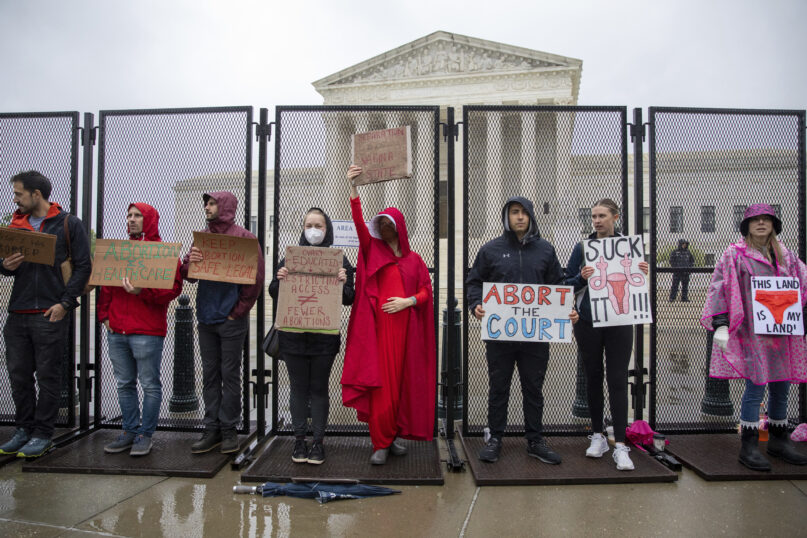(RNS) — “It makes you not even want to bring a child into the world,” a friend said to me recently. She was not talking about war, mass shootings or the grim state of affairs in our society — though, there’s that. We were discussing the recent revelation that the U.S. Supreme Court had preliminarily voted to overturn Roe v. Wade, which would automatically put abortion out of reach of women in nearly half the states.
In light of this, we were talking about the terms on which women have been asked to bring forth children. Our grandmothers fought for child care. Our mothers fought for health care. Today a scant percentage of women have affordable versions of either. It is demoralizing.
For some of the architects of this moment, demoralization is precisely the point.
RELATED: Pelosi vs. Cordileone isn’t only about abortion. It’s about women and bishops
Frank Cotham, a cartoonist featured often in The New Yorker, captured the political uses of demoralization well. “Go find out why a peasant is giggling at midday,” the king orders from his coach, scowling in the direction of a common man digging potatoes with a rake. A speech bubble above the man’s laughing face reads “Har! Har!”
The driver of the king’s coach gives the king side-eye. Even the two horses roll their eyes. The king is up to it again. Power means domination, or what good is it? And power is supposed to be demoralizing.
This is an apt portrayal of pro-life politics. The powers that are taking away abortion access intend for us to be scared of sex — which they want to be about pregnancy, not, say, orgasm. Spontaneity, joy, frivolity — the fruits of genuine freedom — are forbidden.
Michelle Goldberg describes in her 2010 book “Means of Reproduction: Sex, Power, and the Future of the World” how political grand strategists use fear of sex:
The history of our species is, by and large, a history of male domination. The subordination of women, and their reduction to their reproductive function, has been such a constant that it can appear somehow normal and right, while the upending of old roles seems to cause a disorientating chaos . . . Emancipated women become a symbol of everything maddening and unmooring about modernity. To tame them seems a first step to taming an unruly world.
In “The Terror Dream: Myth and Misogyny in an Insecure America,” Susan Faludi, the Pulitzer Prize-winning author of “Backlash: The Undeclared War Against American Women,” tracks how the “war on terror” intertwined with gender conservatism to make gender traditionalism seem “normal and right.”
Openly queer people regularly refuse this demoralization, despite the attempt to traumatize their sexual lives as well. James Baldwin named this in one of his last interviews, with the Village Voice’s Richard Goldstein in 1984.
Baldwin linked fear of homosexuality with the fear of human sexuality. “The terrors homosexuals go through in this society,” he said, “would not be so great if the society itself did not go through so many terrors which it doesn’t want to admit. The discovery of one’s sexual preference doesn’t have to be a trauma. It’s a trauma because it’s such a traumatized society.”
Goldstein asked him, “Have you got any sense of what causes people to hate homosexuals?” and Baldwin replied, “Terror, I suppose. Terror of the flesh. After all, we’re supposed to mortify the flesh, a doctrine which has led to untold horrors.”
This isn’t just for queer people — “the so-called straight person is no safer than I am really,” Baldwin noted. “Loving anybody and being loved by anybody is a tremendous danger, a tremendous responsibility. Loving of children, raising of children.”
Love as the truly committed, vulnerable, naked connection with another mortal, frail, miraculous human being is scary enough. Who is up for that, really? But, as Baldwin explained, the raising of children? That tremendous danger? That tremendous responsibility? Facing this, without even the bare minimum of social support? It makes you not even want to bring a child into the world.
RELATED: Advocate for abortion if you must. But don’t say poor people made you do it.
Why do grand strategists of gender conservatism gain by taming women, traumatizing gay people and mortifying flesh? It makes the world seem manageable.
Let’s refuse their demoralization. Cotham’s cartoon would be macabre, if not for the whimsy in the googly eyes. The coach driver is incredulous, the horses annoyed by what is clearly a futile, feudal effort to control all mirth. The peasant giggles at midday, mouth open with glee.
May we see these kings for what they are. Desperate. Mock them. “Har! Har!”
(Amy Laura Hall is associate professor of Christian ethics and of gender, sexuality and feminist studies at Duke Divinity School. She is the author, most recently, of “Laughing at the Devil: Seeing the World With Julian of Norwich.” She thanks Sean Larsen for noting the importance of the Voice interview with James Baldwin. The views expressed in this commentary do not necessarily reflect those of Religion News Service.)





